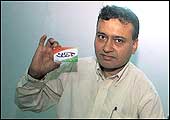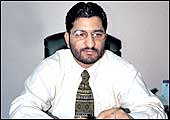|
|
| Rajat Verma/Director (Operation) |
| EZEEBIZ: Translation,
anyone? The company recently launched a set of four Hindi-to-English
books and cassettes (Price: Rs 6,615). Distributors enrol by
purchasing a set but can earn returns only by signing on more
distributors, not selling the books. |
 |
| Pramod Khullar/Chairman |
| LIFE CARE: The company
that sells privilege cards and toiletries has 90,000 distributors.
None could be seen at its distribution centre. Now, Life Care
is diversifying into durables and gift products. |
 |
| Jeet Kalsi/Managing Director |
| STERLING LIFE: Its
Delhi distribution is abuzz with activity; distributors from
lower middle-class families are scrambling to pay Rs 17,500,
and buy durables they do not need, and can't even sell. Their
income is dependent on their ability to hire more distributors. |
The
district centre in Delhi's western borough Janakpuri presents an
impressive sight. In heaving Delhi it is an oasis of order: neat
rows of shops; covered corridors that protect shoppers from the
scorching summer sun; and enough underground parking to accommodate
a fleet of Hummers. Should you take the trouble to visit, you can't
miss hordes of young men, some probably still in college, sporting
black ties with a legend that says SL. In the basement of District
Centre, Jaina Tower I, is the Delhi office and distribution centre
of a relatively unknown company, Sterling Life (SL) India. The young
men are its distributors.
At first sight, Sterling Life India appears
to be just another network marketing company-those that sell through
networks or parties-in the same league as "the Amways and Avons
of the world", as Jeet Kalsi, Sterling's Managing Director,
claims. It sells consumer durables (coffee makers, water heaters,
colour televisions, and vacuum cleaners) through a network of distributors.
And what a network that is; in three years of existence Sterling
Life has acquired an enviable 45,000 distributors across seven North
Indian cities, including Delhi.
All one has to do to become a distributor with
Sterling Life is to buy consumer durables worth Rs 17,500. "Well,
this amount, being significant, makes the distributor feel he is
investing in a business, and therefore makes him serious about the
business," is how Kalsi explains the higher-than-high entry-cost.
Most known direct sellers charge a nominal entry fee; Avon charges
nought. Sterling is a unique multi-level marketer in more ways than
one. The products distributors buy is rarely sold; they just need
to buy them, whether they need another television or not. Distributors
earn virtually their entire commission on new referrals and not
on product sales. Indeed, of the company's sales of Rs 50 crore,
just around Rs 1 crore comes from such business. The rest comes
from new distributors.
There's more to this unique business model:
distributors aren't eligible for refunds; and when something goes
wrong with a product, and it can't be repaired, "we simply
replace it with a new one," in the words of Kalsi. By the end
of this year, Sterling hopes to add 30,000 distributors to its network
(that's a cool Rs 52.5 crore in sales).
Is Sterling really an above-the-board direct
seller as Kalsi would like us to believe? And what about hundreds
of other such companies, Life Care (sales: Rs 40 crore; 90,000 distributors),
Interworld.Com, the erstwhile First Biz Network (sales: Rs 20 crore;
37,000 distributors), Revolution Forever (sales: Rs 6 crore; 15,000
distributors), Ezeebiz (sales: Rs 8.35 crore; 55,000 distributors),
Infigrow, In Paradise Network, SBC Network, Speed Matrix India and
White Sapphire, all in New Delhi; Conybio Healthcare (sales: Rs
60 crore; 1,80,000 distributors) and GoldQuest International (12,000
distributors) in Chennai; Infiniteopps (sales: Rs 17.5 crore; 15,000
distributors) in Pune; Cossets in Chandigarh; and Pioneer Ebizz
in Hyderabad?
A Proxy for Ponzi
Pyramid schemes are illegal in India; the Prize
Chit and Money Circulation (Banning) Scheme Act, 1978, bans them.
But direct marketing is alright, and don't network marketers reward
distributors for hiring more distributors? It didn't take long for
some unscrupulous, but wholly legal, companies to come up with the
kind of get-rich-quick-through-direct-marketing schemes that appeal
to Indians. They purport to sell everything from privilege cards,
soaps and cosmetics, grocery products, durables, vacations, books,
educational CDs, gold coins, even sun beads.
Take the case of the two-year old, Rs 40-crore
Life Care, a 90,000-member strong New Delhi-based company, ostensibly
selling a discount card and a range of cosmetics and toiletries,
all eponymous. When this writer visited its office-plus-distribution
centre in Rohini, a residential area in North-West Delhi, the outlet
supposed to dispense products was locked. It was subsequently opened
for this writer's benefit, but there wasn't a single distributor
in sight-strange, for a company that claims 15,000 active distributors
in Delhi alone. "I am discontinuing the existing scheme, and
starting a new plan with unlimited depth," says the apologetic
Chairman, Pramod Khullar, when told that his company's direct marketing
scheme seems more like a money-chain than anything else.
HOW IT WORKS?
The M.O. of unscrupulous direct marketers. |
STEP
1: The law bans pyramid
money schemes...
...So call yourself a direct marketer and identify a product
you can sell
STEP 2: Sell
this product to distributors but don't encourage them to re-sell...
.... Instead reward them for identifying more distributors
STEP 3: Build
the chain of distributors...
...as long as you can continue to, the Ponzi scheme will
not come unstuck
|
Companies such as Life Care can operate with
impunity, reasons Sameer Modi, Managing Director of legit direct
seller Modicare, because there are no specific laws governing direct
selling in this country. Most countries, including Malaysia and
South Africa, regulate their direct selling industries through specific
legislation. In India, the concerned ministry, the Ministry of Consumer
Affairs, Food & Public Distribution, states that, "...The
need for a separate legislation was not felt in view of the fact
that there are adequate provisions available in the Sale of Goods
Act, 1930, (for regulating the sale of goods); the Indian Contract
Act, 1872, (for the sale of services) and the Consumer Protection
Act, 1986, (to promote and protect the rights of the consumers."
That doesn't really help, says Harmeet S. Pental, the President
of the Indian Direct Selling Association, because, by the time these
laws can be called into effect, the damage is done. "Pre-emption
and not just redressal is the need here," adds IDSA's Pental.
The law can't touch these companies because
they have a product to show. "Where the business thrives more
on structure of business rather than actual product sale, our suspicions
are raised,'' says S. Krishnamoorthy, an Indian Police Service officer,
handling crime in Chennai. "There is no question of everybody
benefiting, somebody always loses.'' Yet, the police has not made
much headway in its investigations into the activities of Conybio
Healthcare, a direct seller of toothpaste (minimum price Rs 210)
and sun beads (Rs 15,000).
There's no shortage of gulls. Another Chennai-based
company, GoldQuest International hawks a gold coin at Rs 43,000,
a 100 per cent premium over what it should cost. It has found 12,000
takers even though D. Hemchandra Rao, President, Madras Coin Society,
warns that, "In the case of GoldQuest, the coin is neither
a period coin nor is it by an authorised body (like government mints)."
But the company's Country Head Pushpam Naidu defends it by saying:
"GoldQuest is well within its rights to operate in India and
I have a document from the Minister of Consumer Affairs that says
so." Over 37,000 people have already bought an e-shop for Rs
5,000 each, from the New Delhi-based First Biz Network! Heard of
Revolution Forever? The company's main product is a discount card
priced at Rs 6,500 (it has 15,000 distributors). Ezeebiz has over
55,000 distributors for a set of four basic Hindi-to-English translation
books and audio cassettes priced at Rs 6,615 besides other packages.
And Pune-based Infiniteopps offers computer education packages starting
at Rs 1,350 (it has over 1,00,000 customers and 15,000 distributors).
Almost every one of these companies has a binary
direct selling plan that rewards distributors for recruiting other
distributors. "Binary plans, by and large, are just recruitment-focussed
and walk a thin line from being a pyramid scheme," explains
IDSA's Pental, who is also Managing Director of the Rs 100-crore
Avon Beauty Products. IDSA estimates that there could be 1,000 such
companies out there, paying unsustainable returns of around 80 per
cent on sales (the legit ones pay 40 per cent) largely for recruitment.
At average sales of Rs 3-4 crore, the size of this industry is around
Rs 4,000 crore (the actual number could be much larger), far higher
than the Rs 1,723-crore organised and legitimate direct selling
industry in India.
Buoyed by the lack of regulation, more unscrupulous
entrepreneurs are entering the business. In the past six months,
39 new members sought membership of IDSA, with just two being shortlisted
for consideration, a measure of the rot that has set in the industry.
And existing ones are diversifying. First Care is moving into durables
and gift hampers; Sterling Life and Revolution Forever into toiletries
and cosmetics. And all of them believe there is nothing illegal
(there isn't) about their business. "We're not pyramid, but
binary," says Manmohan Gupta, Chairman, Interworld.Com. "And
who is IDSA to cast aspersions on our model?" Not that these
aspersions count for anything: IDSA reported the activities of First
Biz Network to Delhi Police in April 2003 ("...we feel is operating
money circulation scheme..."), through a letter to the Assistant
Commissioner of Police, Kalkaji (a South Delhi neighbourhood), in
whose jurisdiction the company is based. Nothing much happened,
because existing laws are geared for redressal, not pre-emption.
Things will probably continue in the same tenor
until a large pyramid scheme company disguised as a direct seller
goes under (all pyramid schemes are based on the company's ability
to keep growing its base of distributors; the minute its network
stagnates, its business becomes unsustainable). By then, it may
be too late.
-additional reporting by Nitya Varadarajan
and Dipayan Baishya
|

